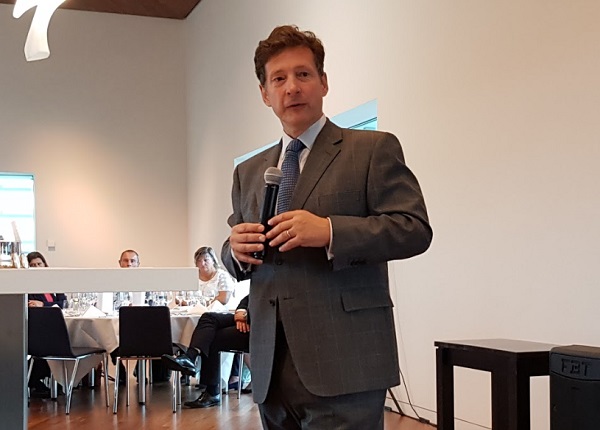 Guest speaker Nicolas Mackel, CEO of Luxembourg for Finance;
Credit: Jazmin Campbell
Guest speaker Nicolas Mackel, CEO of Luxembourg for Finance;
Credit: Jazmin Campbell
The British Chamber of Commerce (BCC) for Luxembourg held its traditional rentrée lunch on Thursday, with a talk on "Brexit and Beyond" with special guest speaker Nicolas Mackel, CEO of Luxembourg for Finance.
As the Brexit deadline draws ever nearer, the topic is as relevant as ever. Indeed, this marked Nicolas Mackel's third speech on Brexit to the BCC in recent years. On this occasion, Mr Mackel, who has had a long career in the areas of law, higher education, international affairs and finance, opened his speech by quirking that Brexit developments have proven "better than a Netflix series".
On a more serious note, Nicolas Mackel highlighted the need for continued civilised debate, of which the UK has always been an example (according to Mackel), especially in times like these when the debate seems to be "reaching levels of toxicity". In this regard, he emphasised the importance of listening to each other's views regardless of whether we agree with them or not.
Referring to the current state of affairs, Nicolas Mackel summarised the two potential outcomes: a deal is passed, the British Parliament enacts this deal and the UK leaves the EU as planned on 31 October 2019. This would include a transition period as foreseen in the previously proposed deal; or, the UK leaves without a deal, in which case British and EU decision-makers would then need to immediately start discussing future relations. Mr Mackel was confident that Brexit, regardless of the form it takes, would not mark the end of UK-EU relations, not least because the British will want to maintain close links with "the largest integrated market in the world".
Regarding the impact of Brexit on Luxembourg's financial services industry, Nicolas Mackel clarified that most if not all major companies had begun preparations for a no-deal Brexit to be ready for the previous deadline of 29 March 2019. These preparations have seen some firms move to other European capitals, although this mainly affected specific activities rather than entire companies. Top relocation spots include Frankfurt, Paris and Dublin, as well as Luxembourg, which has mainly seen growth in the areas of wealth and asset management. Mr Mackel added that some of the smaller firms, namely in the areas or alternative investment or FinTech, are slightly less prepared for a no-deal.
In terms of statistics and estimates, Luxembourg for Finance has confirmed the relocation of 57 firms to Luxembourg to date. This figure refers to companies that have publicly confirmed their relocation. If one were to include those companies which have relocated or are in the process of relocating to the Grand Duchy, Nicolas Mackel estimated a total of 70-80 firms. Nevertheless, he recalled that most of those firms already had activities in Luxembourg prior to the UK's decision to withdraw from the EU, thus this has been more about adding and consolidating their existing presence.
Concerning job creation in the Grand Duchy, Nicolas Mackel maintained his previous estimations of some 3,000 jobs within or around the first two years after Brexit. In this regard, he reiterated that effects are likely to be more greatly felt in the medium- to long-term. This also applies to the loss of potential business. Nicolas Mackel went on to "dispel the myth" that the Luxembourg economy would be significantly worse off than that of the UK after Brexit, calling the idea "preposterous". Instead, he argued that cities such as Frankfurt and Luxembourg, which are somewhat benefitting from these relocation choices, will "grow in their specificities underlined by Brexit", and thus increase the multipolarisation of the EU's financial landscape. This could in turn lead to increased efficiency.
Turning to the "Beyond" part of the speech, Nicolas Mackel highlighted China-US trade tensions, digitisation and climate change as some of the other huge challenges facing us today. He explained that whilst "Brexit affects the operational set up of finance in Europe", it is digitisation that will be "far more transformative to industry".
The Luxembourg for Finance CEO concluded by highlighting the importance of democracy: "If Brexit and the current world political climate teaches us anything, it's that democracy is a precious good". He added that "politics is about ideas not ideology", referring to the relation between politicians and the rise of populism.
The event continued with a Q&A session, during which the British Ambassador to Luxembourg, John Marshall, expressed agreement with most if not all of Nicolas Mackel's remarks. Nevertheless, the Ambassador clarified that the British Prime Minister is "absolutely serious about getting a deal" and that the UK Government is putting forward "ideas and concepts to replace the backstop". In this regard, "progress is being made, gaps being narrowed but a huge amount of work remains to be done in the short time ahead". Secondly, the British Ambassador highlighted how the UK and EU governments have been actively preparing for Brexit, for instance with citizen's rights sessions. He added that both he and the UK Government believe it is time to "draw this phase to an end and start looking at the future constructive and positive relationship with the EU". The ambassador concluded by highlighting climate action as one of the potential avenues for closer cooperation between the UK and Luxembourg, and the UK and the EU in the near future.
The Q&A was followed by lunch and a networking cocktail. The rentrée lunch, held traditionally around the time of the return to work and school, marks the start of a jam-packed programme for the BCC. The next event, the Leadership Forum (formerly the CEO Forum), is scheduled for Wednesday 16 October at the Banque de Luxembourg; the forum will discuss the compatibility of "power, cash and conscience".








